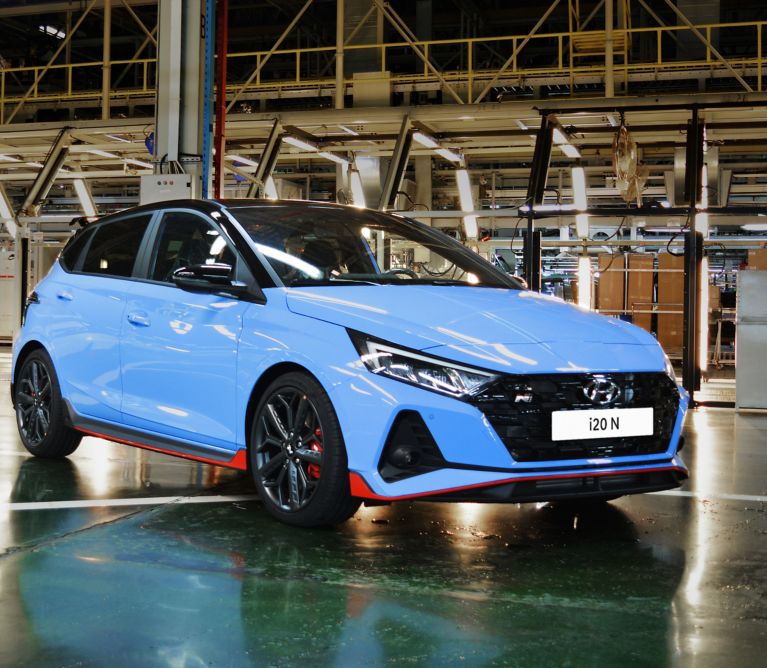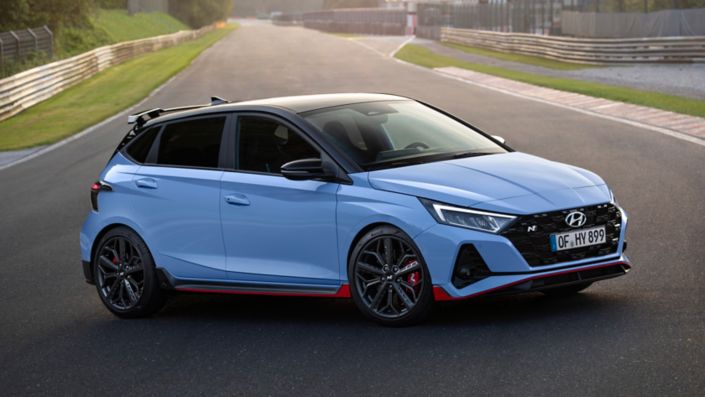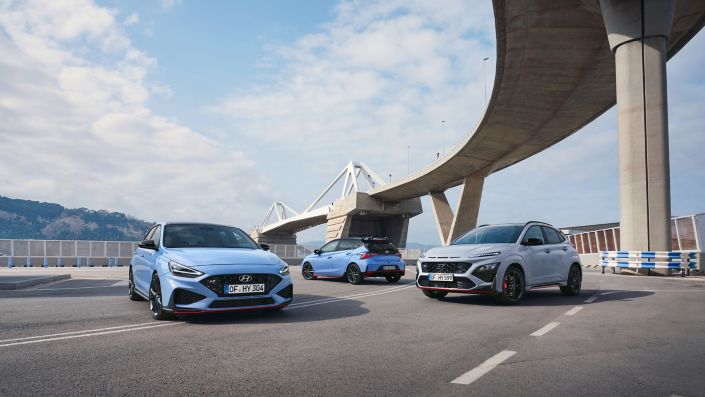- Production begins for all-new i20 N and i20 N Line at production plant in Turkey
- Models designed to bring a sportier experience to the i20 range
- Both models will be available in Europe starting summer 2021
Press material
-
Download
-
Images
Hyundai Motor has begun production for the new i20 N and i20 N Line at its Hyundai Assan Otomotiv Sanayi production plant in Izmit, Turkey. The new models join the i10, i10 N Line, and the regular all-new i20 on the line. The all-new BAYON will also begin production in the plant later this year.
All-new i20 N Line: performance-inspired interior meets exterior design enhancements
Combining the class-leading connectivity and safety of the all-new i20 with N Line sportiness, the all-new i20 N Line is designed to bring a dynamic experience to even more customers. Contributing to the car’s dynamic look are motorsport-inspired grey accents, a sleek rear bumper, a triangle shaped fog lamp, and a chrome twin muffler exhaust system.
The all-new i20 N Line offers a standard 1.2-litre MPi engine with 84 PS and a 1.0-litre T-GDI engine with 100 PS or 120 PS. It is available with 48-volt mild hybrid technology, which can also be combined with an Intelligent Manual Transmission (iMT) for even greater fuel efficiency.
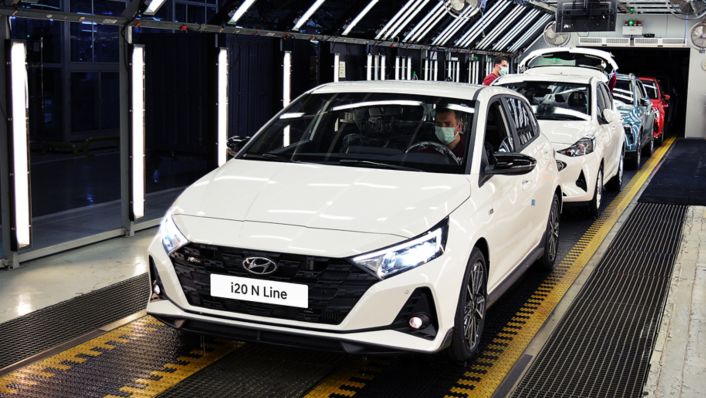
All-new i20 N: a racetrack capable hot hatch
The all-new i20 N offers maximum fun to drive thanks to its high-performance engine and dynamic technological innovations. Launched under the motto “ultimate corner rascal”, its exterior design is characterised by a sporty, motorsport-inspired appearance, including a prominent front bumper with a large air intake, a wide “chequered flag” radiator grille with the N logo, and a lip spoiler featuring red accents.
The all-new i20 N is powered by a 1.6-litre turbocharged flat-power GDI engine with a six-speed manual transmission (6MT). It delivers a maximum output of 204 PS and a maximum speed of 230 km/h, going from 0-100 km/h in only 6.2 seconds. The hot hatch is equipped with a number of dedicated high-performance functionalities for a sporty experience, including Launch Control and Rev Matching. Moreover, five distinct drive modes optimise the driving parameters for a variety of conditions. Strong acceleration, sporty suspension and responsive handling contribute to the dynamic character of the all-new i20 N.
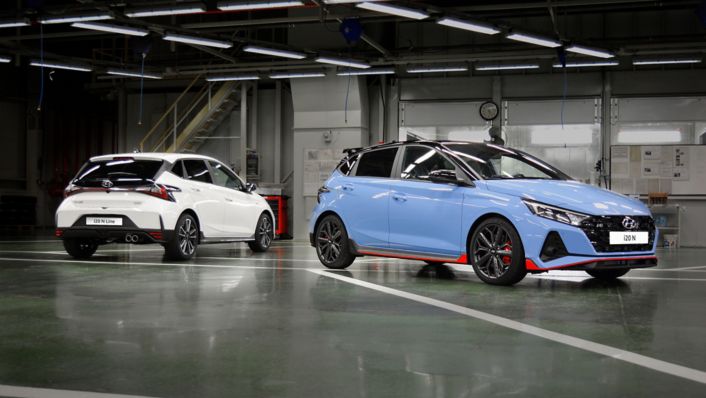
Fuel consumption combined for the Hyundai i20 N 1.6 TGDI (204 PS) with 6MT in l/100 km: 6.9; CO2 emissions combined in g/km: 158 (WLTP)
i20 N Line and i20 N to bring a sportier experience to the i20 range
Both the all-new i20 N Line and the all-new i20 N were designed to bring a more sporty experience for customers. The all-new i20 is the latest Hyundai model to feature the dynamic N Line trim. The all-new i20 N, on the other hand, is a racetrack-capable hot hatch inspired by the i20 WRC rally car which has led Hyundai to global motorsport success. In 2019 and 2020, Hyundai was crowned the WRC manufacturers’ champion.
The i20 N and i20 N Line will be available in Europe starting summer 2021.
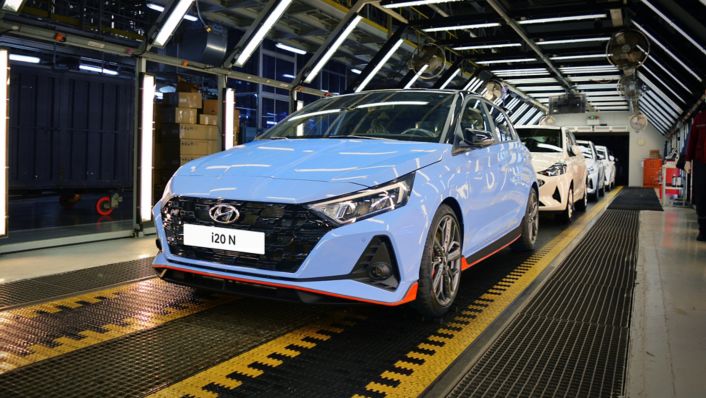
Fuel consumption combined for the Hyundai i20 N 1.6 TGDI (204 PS) with 6MT in l/100 km: 6.9; CO2 emissions combined in g/km: 158 (WLTP)
About Hyundai Assan Otomotiv Sanayi
Hyundai Assan Otomotiv Sanayi (HAOS) is Hyundai’s longest-running plant outside of Korea and has been in operation since 1997. With nearly 2,500 employees, it has an annual capacity of 230,000 units. The plant has four main production lines, consisting of press, body, paint and assembly. In 2019, Hyundai celebrated the two millionth vehicle produced at its Turkish plant. i20 is the most produced vehicle with over one million units of production since its start of production at HAOS in 2010.
Disclaimer: CO2 and emissions data
- Fuel consumption combined for the Hyundai i20 1.2 MPi (84 PS) with 5MT in l/100 km: 5.7‑5.4; CO2 emissions combined in g/km: 129-124 (WLTP)
- Fuel consumption combined for the Hyundai i20 1.0 T-GDI (100 PS) with 6MT in l/100 km: 5.5-5.1; CO2 emissions combined in g/km: 127-117 (WLTP)
- Fuel consumption combined for the Hyundai i20 1.0 T-GDI (100 PS) with 7DCT in l/100 km: 5.8-5.3; CO2 emissions combined in g/km: 131-120 (WLTP)
- Fuel consumption combined for the Hyundai i20 1.0 T-GDI 48V (100 PS) with 6iMT in l/100 km: 5.4-4.9; CO2 emissions combined in g/km: 123-113 (WLTP)
- Fuel consumption combined for the Hyundai i20 1.0 T-GDI 48V (100 PS) with 7DCT in l/100 km: 5.6-5.1; CO2 emissions combined in g/km: 128-115 (WLTP)
- Fuel consumption combined for the Hyundai i20 1.0 T-GDI 48V (120 PS) with 6iMT in l/100 km: 5.4-5.0; CO2 emissions combined in g/km: 124-115 (WLTP)
- Fuel consumption combined for the Hyundai i20 1.0 T-GDI 48V (120 PS) with 7DCT in l/100 km: 5.4-5.1; CO2 emissions combined in g/km: 124-116 (WLTP)
- Fuel consumption combined for the Hyundai i20 Kappa 1.4 with 6MT in l/100 km: 6.5-6.2; CO2 emissions combined in g/km: 148-142 (WLTP)
- Fuel consumption combined for the Hyundai i20 Kappa 1.4 with 6AT in l/100 km: 7.1-6.5; CO2 emissions combined in g/km: 162-147 (WLTP)
- Fuel consumption combined for the Hyundai i20 N 1.6 TGDI (204 PS) with 6MT in l/100 km: 6.9; CO2 emissions combined in g/km: 158 (WLTP)
- Fuel consumption combined for the Hyundai i10 1.0 (4 seater eco) with 5MT in l/100 km: 5.4‑4.8; CO2 emissions combined in g/km: 122-110 (WLTP)
- Fuel consumption combined for the Hyundai i10 1.0 (4 seater) with 5MT in l/100 km: 5.5-4.9; CO2 emissions combined in g/km: 125-111 (WLTP)
- Fuel consumption combined for the Hyundai i10 1.0 (4 seater) with 5AMT in l/100 km: 5.9‑5.2; CO2 emissions combined in g/km: 134-119 (WLTP)
- Fuel consumption combined for the Hyundai i10 1.0 (5 seater) with 5MT in l/100 km: 5.5-5.0; CO2 emissions combined in g/km: 126-114 (WLTP)
- Fuel consumption combined for the Hyundai i10 1.0 (5 seater) with 5AMT in l/100 km: 5.9‑5.2; CO2 emissions combined in g/km: 134-119 (WLTP)
- Fuel consumption combined for the Hyundai i10 1.2 (4 seater) with 5MT in l/100 km: 5.8-5.1; CO2 emissions combined in g/km: 132-117 (WLTP)
- Fuel consumption combined for the Hyundai i10 1.2 (4 seater) with 5AMT in l/100 km: 6.1‑5.4; CO2 emissions combined in g/km: 138-122 (WLTP)
- Fuel consumption combined for the Hyundai i10 1.2 (5 seater) with 5MT in l/100 km: 5.8-5.1; CO2 emissions combined in g/km: 132-117 (WLTP)
- Fuel consumption combined for the Hyundai i10 1.2 (5 seater) with 5AMT in l/100 km: 6.1‑5.4; CO2 emissions combined in g/km: 138-122 (WLTP)
- Fuel consumption combined for the Hyundai i10 1.0 T-GDI in l/100 km: 5.4; CO2 emissions combined in g/km: 123 (WLTP)
- Fuel consumption combined for the Hyundai BAYON 1.2 MPi (84 PS) with 5MT in l/100 km: 5.7-5.4; CO2 emissions combined in g/km: 129-124 (WLTP)
- Fuel consumption combined for the Hyundai BAYON 1.0 T-GDI (100 PS) with 6MT in l/100 km: 5.6-5.3; CO2 emissions combined in g/km: 129-122 (WLTP)
- Fuel consumption combined for the Hyundai BAYON 1.0 T-GDI (100 PS) with 7DCT in l/100 km: 5.6-5.3; CO2 emissions combined in g/km: 128-122 (WLTP)
- Fuel consumption combined for the Hyundai BAYON 1.0 T-GDI 48V (100 PS) with 6iMT in l/100 km: 5.5-5.2; CO2 emissions combined in g/km: 125-118 (WLTP)
- Fuel consumption combined for the Hyundai BAYON 1.0 T-GDI 48V (100 PS) with 7DCT in l/100 km: 5.4-5.2; CO2 emissions combined in g/km: 124-118 (WLTP)
- Fuel consumption combined for the Hyundai BAYON 1.0 T-GDI 48V (120 PS) with 6iMT in l/100 km: 5.5-5.2; CO2 emissions combined in g/km: 125-118 (WLTP)
- Fuel consumption combined for the Hyundai BAYON 1.0 T-GDI 48V (120 PS) with 7DCT in l/100 km: 5.4-5.2; CO2 emissions combined in g/km: 124-118 (WLTP)
- Fuel consumption combined for the Hyundai BAYON Kappa 1.4 with 6MT in l/100 km: 6.2; CO2 emissions combined in g/km: 142 (WLTP)
- Fuel consumption combined for the Hyundai BAYON Kappa 1.4 with 6AT in l/100 km: 6.4; CO2 emissions combined in g/km: 147 (WLTP)

